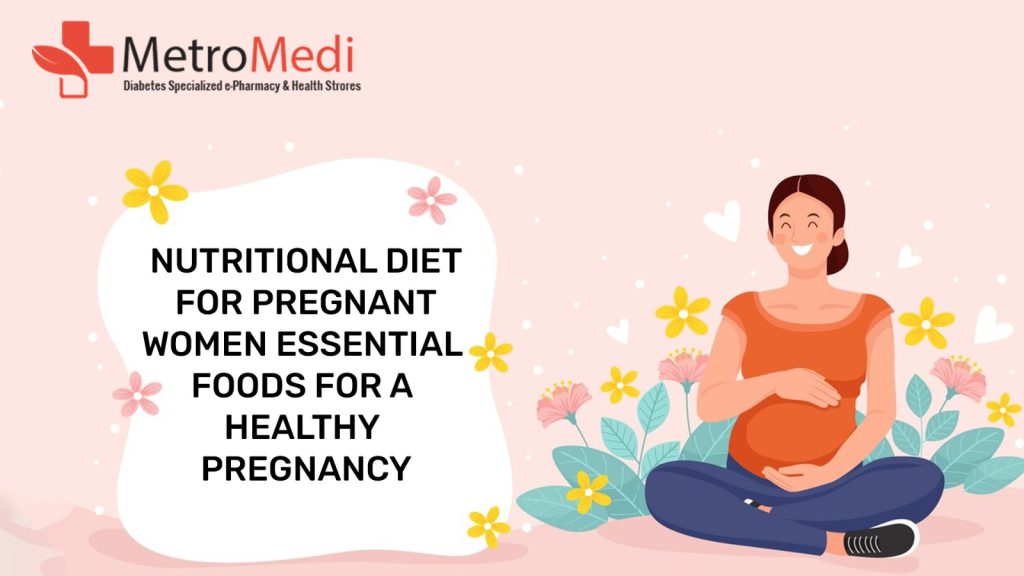
Pregnancy is a transformative journey filled with anticipation and joy, accompanied by the responsibility of nurturing both your own health and that of your growing baby. A balanced and nutritious diet during pregnancy is essential for optimal maternal health and fetal development. Here’s a comprehensive guide to crafting a pregnancy diet that includes healthy foods and fruits for pregnant women to support a healthy pregnancy.
Importance of a Healthy Diet for Pregnant Women
Eating a well-balanced diet during pregnancy provides the necessary nutrients for the growth and development of your baby, while also supporting your own health and well-being. Key nutrients such as folate, iron, calcium, omega-3 fatty acids, and vitamins are crucial during this time to ensure healthy fetal development and to help prevent complications such as neural tube defects and preterm birth.
Pregnancy Diet: Best Foods for Pregnancy
- Fruits for Pregnant Women: Fruits are packed with vitamins, minerals, and antioxidants essential for both mother and baby. Opt for a variety of fruits such as oranges (rich in vitamin C), bananas (good source of potassium), berries (high in antioxidants), and apples (fibre-rich and hydrating).
- Vegetables for Pregnant Women: Incorporate a colourful array of vegetables into your meals to ensure a diverse range of nutrients. Leafy greens like spinach and kale provide folate and iron, while carrots and sweet potatoes offer beta-carotene and vitamin A.
- Whole Grains: Whole grains like brown rice, quinoa, oats, and whole wheat bread provide fibre, B vitamins, and essential minerals. These help regulate digestion and provide sustained energy throughout the day.
- Lean Proteins: Choose lean sources of protein such as poultry, fish (low in mercury), beans, lentils, tofu, and nuts. Protein is crucial for the growth of the baby’s cells and tissues.
- Dairy or Dairy Alternatives: Opt for low-fat dairy products or fortified plant-based alternatives like almond milk or soy yogurt to ensure adequate calcium and vitamin D for bone development.
- Healthy Fats: Include sources of healthy fats such as avocados, nuts (like almonds and walnuts), seeds (flaxseeds and chia seeds), and olive oil. These fats support the baby’s brain and nervous system development.
Foods to Avoid During Pregnancy
- High-Mercury Fish: Avoid high-mercury fish such as shark, swordfish, king mackerel, and tilefish. Instead, choose low-mercury options like salmon, shrimp, and catfish.
- Raw or Undercooked Meats and Eggs: To prevent foodborne illnesses, ensure all meats, poultry, seafood, and eggs are cooked thoroughly.
- Unpasteurized Dairy and Juices: Steer clear of unpasteurized milk, cheese, and fruit juices as they may contain harmful bacteria.
- Caffeine and Alcohol: Limit caffeine intake to no more than 200 milligrams per day (equivalent to one 12-ounce cup of coffee) and avoid alcohol completely during pregnancy.
Healthy Eating Tips for Pregnant Women
- Stay Hydrated: Drink plenty of water throughout the day to support healthy amniotic fluid levels and prevent dehydration.
- Eat Small, Frequent Meals: This can help alleviate nausea and heartburn, common discomforts during pregnancy.
- Take Prenatal Supplements: Consult with your healthcare provider about taking prenatal vitamins containing folic acid and other essential nutrients.
Conclusion
Crafting a healthy diet for pregnant women that is rich in fruits for pregnant women, vegetables for pregnant women, whole grains, lean proteins, and healthy fats is crucial for supporting a healthy pregnancy and ensuring the best possible outcomes for both mother and baby. By focusing on nutrient-dense foods and avoiding potential risks, you can nurture your body and promote optimal fetal development. Remember, each pregnancy is unique, so it’s important to consult with your healthcare provider for personalized dietary recommendations and guidance throughout this transformative journey.
